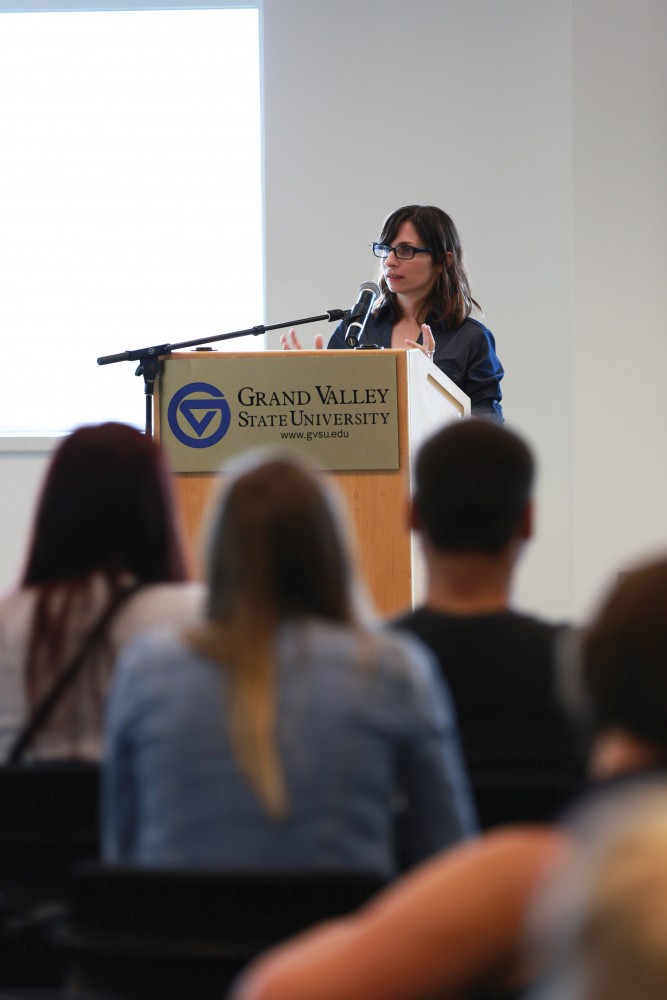Pro-Palestinian speaker urges students to action

GVL / Kevin Sielaff Author of In Our Power: U.S. Students Organize for Justice in Palestine, Nora Barrows-Friedman speaks inside the Kirkhoff Center Sept. 28.
Oct 1, 2015
With 126 chapters throughout U.S. universities, “Students for Justice in Palestine” is a movement receiving increased attention among college campuses.
Healing Children of Conflict, a volunteer-led nonprofit located in Grand Rapids that facilitates medical treatments for children wounded in conflicts involving the U.S., brought in social issue speaker Nora Barrows-Freidman to talk to the Grand Valley State University community about student activism around equal rights and justice for the Palestinian people on Sept. 29.
“We haven’t seen an organized drive among students this vibrant across the country since the 1980, when mobilized in South Africa, and there are very important links between the two situations,”said David Alvarez, GVSU English professor and event host.
Barrows-Freidman, author of “In Our Power: U.S. Students Organize for Justice in Palestine” and associate editor of the Electronic Intifada, has been published in media outlets such as Truthout and Al Jazeera English. She is traveling throughout West Michigan as part of a four-part series that includes presentations at Western Michigan University, Calvin College, Hope College and GVSU.
Barrows-Freidman focused her talk on her trips to Palestine as a reporter for Pacifica Network Radio and the issues and obligations facing college students in the U.S.
In her book, Barrows-Freidman documents conversations with students leading the fight, talking about the national movement forming from what began as decentralized campaigns scattered across the country. Barrows-Freidman said that U.S. taxpayers hand over more than $3 billion to Israel. This is an issue that she thinks students should pay attention to as, in some cases, this funding includes tuition dollars.
“There is this dynamic and a very moving student movement that is emerging from all corners of this country working under extremely difficult situations to raise their voices and talk about issues that need to be talked about,” Barrows-Freidman said. “This movement is not getting the mainstream publicity, but it’s one of the most dynamic movements of our time right now.”
However, as usual with controversial issues such as these, her message does not come without opposition.
“While it’s true that on other campus students and community members who support occupation, colonization and segregation protest vociferously about the presence of any speaker who argues that Palestinians are human beings and that they therefore deserve the chance to enjoy life, liberty, and the pursuit of happiness, at GVSU complaints have thus far been more muted,” Alvarez said. “Typically, they take the form of more or less politely worded emails sent to faculty members such as myself in protest against the ‘lack of balance’ or the ‘ideological extremeness’ that the speaker’s presence on campus represents.”
Barrows-Freidman encourages students to look into the Midwest coalition for justice based in Chicago and to look at this issue as larger than a foreign policy agenda.
“This is a huge issue that doesn’t just affect Palestinians, but an issue that affects students,” she said. “This is a great campaign to get involved with and it’s not just an isolated instance with Palestinians. It’s about human rights in general, it’s about equality and justice in general,” Barrows-Freidman said. “The same passion for justice and human rights can be applied to so many different issues not only here at Grand Valley but also across the state and across the country and across the world.”
Christine Yared, a panelist at the discussion involved with Healing Children of Conflict, an attorney and adjunct professor at GVSU, agreed with Barrows-Freidman and urged students to think of this issue in the context of several other debates going on in the world.
“I’ve been very active with the LGBT Center in my life and to draw a parallel, this is another social justice issue that I’m passionate about and we need to make those connections so that students can find at least one social issue that means a lot to them,” Yared said. “I encourage them to consider how to connect this issue with other issues such as Black Lives Matter and immigration and make their activism be more meaningful.”
Support for the event came from Kalamazoo Nonviolent Opponents of War, Hope College’s Cultural Affairs Committee, the departments of English and political science, Hope United for Justice, Calvin College’s Middle East Club and the GVSU LGBT Resource Center.























